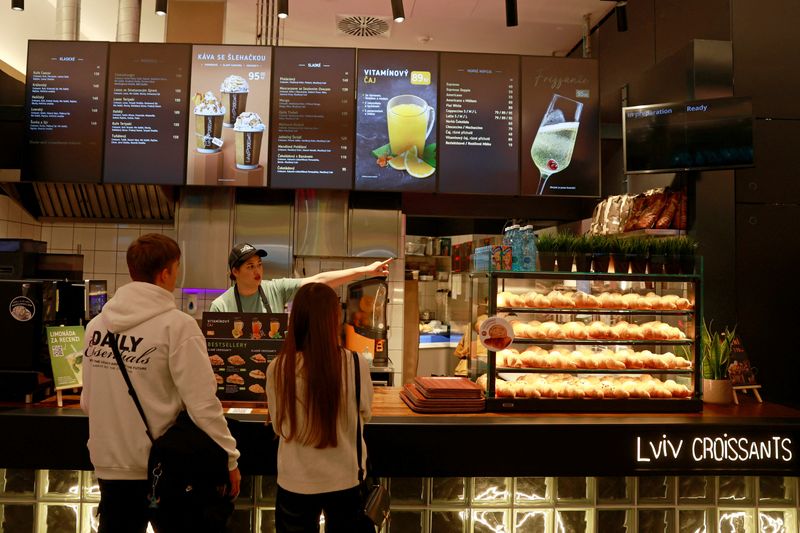
Ukrainian businesses in emerging Europe eye westward expansion
By Michael Kahn and Anna Koper
PRAGUE/WARSAW (Reuters) – Ukrainian businesses that set up or expanded in central Europe after Russia’s 2022 invasion are shifting their focus from mainly refugee to local customers as they become more established, with some now eyeing a move further west.
As the war closed off opportunities at home and to the east, including Russia, Ukrainian-owned businesses sprang up in neighbouring countries, initially targeting their displaced compatriots with food, drink and services.
In Poland, which has a Ukrainian population swelled by the war to more than 1.5 million at current estimates, Ukrainians opened every tenth new business in 2024, according to Polish business associations and economists.
Andrii Halytskyi’s Lviv Croissants now has 12 shops in Poland after launching there two years ago. It opened its first Czech outlet in October, part of what its founder says is a strategy to build a geographically diverse business by expanding westward and beyond the diaspora.
“While the Ukrainian refugee community in Europe is significant, relying solely on this customer base is not a sustainable long-term strategy,” Halytskyi told Reuters.
Strong cultural similarities with Ukraine have helped make Poland a natural base for Ukrainian businesses. But many are also looking beyond emerging Europe’s largest economy to a much bigger pool of customers.
“Companies initially view Poland as a bridge or springboard to European Union markets,” said Dariusz Szymczycha, first vice president of the Polish-Ukrainian Chamber of Commerce.
“They want to learn … the reality, standards, regulations and rules of operating in the European Union.”
The Piana Vyshnia chain of bars is themed around a traditional cherry liqueur from Ukraine but sees local customers as its main target, founder Andriy Khudo told Reuters.
His !FЕST restaurant group has grown the brand – known as Drunken Cherry in English – to 15 locations in Poland and nine in other Baltic and eastern European countries, ramping up westward expansion since February 2022, Khudo said.
The group plans to open in Germany, Switzerland and France in 2025 and relaunch a venue in London, he said, adding that the bars are attracting new customers and are profitable.
“Before the war we focused on Ukraine because our business was developing there so quickly. But the war kicked us to look more west because of the risk in Ukraine,” Khudo said.
REFUGEE BOOST
Although Ukraine’s economy grew in 2023 and is likely to expand in 2024, Economy Minister Yulia Svyrydenko told Reuters in November it was still only at 78% of its size before Russia’s full-scale invasion in February 2022.
With no end to the conflict in sight, businesses like Khudo’s have had to look elsewhere – an economic flip for nearby countries which have also seen labour market strains eased by the arrival of Ukrainian workers.
A Deloitte report in March 2024 estimated that refugees from Ukraine would add up to 1.1 percent to Poland’s GDP in 2023 and as much as 1.35 percent longer-term.
“When they come to Poland, for example, whether to work or set up businesses, this is an additional stimulus from the economic perspective for consumption and improving the supply of labour,” Andrzej Kubisiak, deputy director of the Polish Economic Institute, told Reuters.
Another Ukrainian restaurateur, Olga Kopylova, told Reuters she had no plans before the war to take her Chornomorka brand abroad but now has three outlets named Czarnomorka in Poland and two apiece in Bratislava and Vienna.
Coffee chain Aroma Kava moved to Poland in 2022 and has since expanded to 10 locations, while Ukrainian ice cream and frozen products maker Three Bears bought Polish company Nordis.
Poland is now the second most important market for digital entertainment provider MEGOGO which has grown by appealing to local residents, mainly through family programming, co-founder Volodymyr Borovyk told Reuters. It entered Poland and Romania – emerging Europe’s two most populous countries – in 2023.
“The healthy Polish market not only motivates us but also encourages other Ukrainian companies to enter this market with products tailored specifically for Polish consumers,” he said.
At the newly-opened Lviv Croissants branch in Prague, the staff served a mix of tourists, locals and Ukrainians who sipped coffees and nibbled on sandwiches as they took a break from the holiday rush.
“This was my first time eating here, but for me it is like a feeling of home,” 20-year old Ukrainian student Tatiana Melnyk said.

